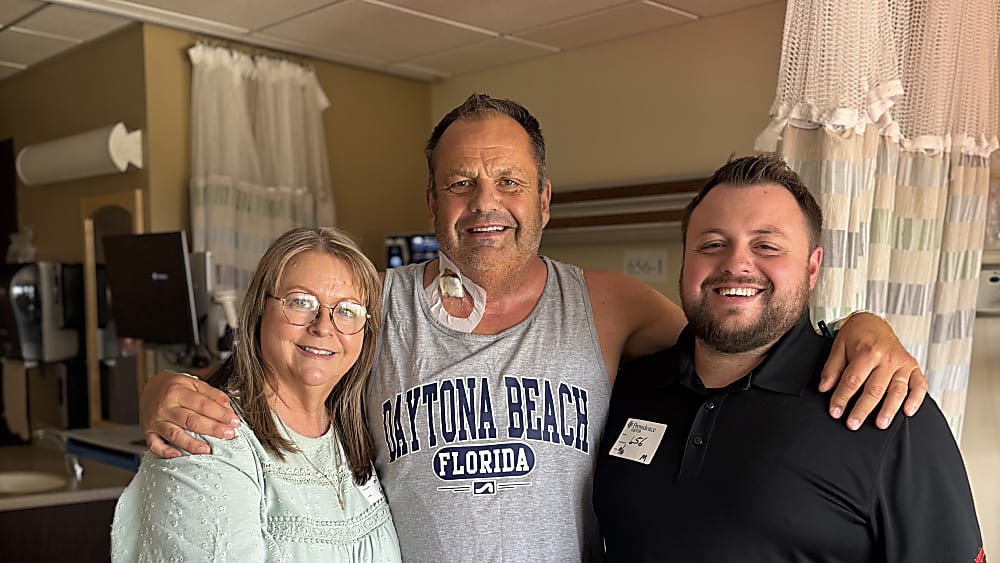
Providence Center for Congenital Heart Disease at Sacred Heart Children's Hospital
We take a personalized approach to treating congenital heart disease (CHD) for patients of all ages – from infancy to adolescence to adulthood. We work with you to create an individualized plan that includes everything from diagnosis and treatment to the post-care or long-term support you or your loved one needs to maintain a normal lifestyle.
Providence Center for Congenital Heart Disease at Sacred Heart Children's Hospital
We take a personalized approach to treating congenital heart disease (CHD) for patients of all ages – from infancy to adolescence to adulthood. We work with you to create an individualized plan that includes everything from diagnosis and treatment to the post-care or long-term support you or your loved one needs to maintain a normal lifestyle.
About Congenital Heart Disease
Congenital heart defects occur before birth in one or more of the structures of the heart. Some people may not have any symptoms until adulthood. Others are treated when they’re children and require regular checkups with a cardiologist in adulthood.
We offer a wide range of treatment options for our patients, including the most advanced therapies and procedures. Your personalized treatment plan may include one or more of the following:
- Ablation
- Angioplasty
- Aortic root surgery
- Aortic valve repair/replacement
- Atrial septal defect (ASD) closure
- Coarctation of the aorta
- Coil embolization of vessels
- Cryoablation
- Heart valve repair, replacement or valvuloplasty
- Implantable cardio defibrillator (ICD)
- Mitral valve repair or replacement
- Mitral valvuloplasty
- Pacemakers
- Patent ductus arteriosus (PDA) closure
- Patent foramen ovale (PFO) closure
- Peripheral angioplasty or stent
- Prescription medications
- Radiofrequency catheter ablation
- Septal myectomy
- Transcatheter aortic valve replacement (TAVR)
- Transcatheter mitral valve repair (TMVR)
- Tricuspid valve repair or replacement
- Valvuloplasty
- Ventricular septal defect (VSD) closure
We use advanced techniques for the most accurate diagnosis of patients with heart conditions. Our comprehensive diagnostic and screening process helps your cardiovascular team create the best treatment plan for you. Screenings may include:
- Angiography
- Blood test
- Chest X-ray
- CT angiography, coronary CT angiography
- CT imaging
- Diagnostic heart catheterization
- Echocardiography (including fetal)
- Electrocardiogram (ECG/EKG)
- Exercise stress test/treadmill stress test
- MRI (cardiac)
- Peripheral arterial testing
- Ultrasound
We offer key support beyond conventional treatment to help you and your loved ones through your treatment journey as comfortably as possible – body, mind and spirit.
- Cardiac rehabilitation
- Chaplain services
- Child Life services
- Counseling
- Financial counseling
- Interpreter services
- Nutrition services
- Patient forms
- Palliative care
- Pharmacy services
- Providence Adult and Teen Congenital Heart (PATCH) Program
- Social work services
Why Choose Us for Congenital Heart Disease Care?
As the only congenital heart program in the region, your local specialized heart care team is at your side for every step of your treatment and recovery, whether it involves monitoring, lifestyle modifications, medication, surgery or support. Here are six more reasons you can trust Providence with your congenital heart disease care:
An Accredited Program
Our Center for Congenital Heart Disease is one of the first programs in the U.S. to be accredited by the Adult Congenital Heart Association Centers (ACHA). This accreditation demonstrates our team’s ability to provide the best possible care for those living with congenital heart disease.
FAQs About Congenital Heart Disease
Here are answers to common questions about congenital heart disease and programs at the Providence Center for Congenital Heart Disease.
Congenital heart disease, often referred to as CHD, is a condition present at birth that affects the structure and function of the heart. It may involve problems with the heart walls, valves or blood vessels.
CHD is often diagnosed through prenatal ultrasounds or shortly after birth. Diagnostic tests may include echocardiograms, electrocardiograms or other imaging studies.
Treatment varies based on the severity of the condition. At the Providence Center for Congenital Heart Disease, it may include medications, surgical procedures, catheter-based interventions and lifestyle changes. A comprehensive treatment plan is usually tailored to each patient's needs.
Caregivers play a crucial role in providing emotional support. They can also help with medication management and day-to-day activities. Open communication with your health care team is key to ensuring the best possible care.
Absolutely. Many individuals with CHD lead fulfilling and active lives with appropriate medical management. It's important for patients to work closely with their care team so they can be as healthy as possible.
Our clinicians are connected to national associations and colleges across the United States. They regularly speak at national conferences and participate in research. Working closely with a care team can help patients and caregivers stay up to date on advances in CHD care and empower them with valuable knowledge.
Yes. By collaborating, our specialists can share their expertise and provide the best possible care for their patients.
Our clinicians work with many other specialists to ensure the best possible care for patients. They include doctors who specialize in advanced heart failure and heart transplants. Our specialists also work closely with maternal fetal medicine experts who provide care for pregnant patients with CHD.
The Providence Center for Congenital Heart Disease provides 24/7 care for patients. This includes support for patients who receive ongoing care and for those who have cardiac and non-cardiac procedures and surgeries. We also offer telehealth services.
Yes. Providence has several outreach locations throughout the Inland Northwest so patients can receive care closer to home.
Regular appointments with a cardiologist are essential to monitor a heart condition and make any needed adjustments to a patient’s treatment plan. Caregivers should be involved in coordinating and attending these appointments.
PATCH stands for Providence Adult & Teen Congenital Heart program. It provides comprehensive, patient-centered care for teens and adults living with congenital heart disease.
PATCH is uniquely positioned to care for adults and teens with congenital heart disease. It is conveniently located in a pediatric cardiology clinic within a larger medical center that offers comprehensive care for adults with congenital heart disease (ACHD).
PATCH ensures a seamless transition by operating within a larger medical center. This allows the program to draw on the expertise of clinicians specializing in both congenital and acquired heart disease.
PATCH provides access to consultations for all subspecialties of cardiac medicine and surgery. The program also offers a full range of ACHD interventional, electrophysiologic and surgical care.
Living with a chronic disease can take a toll on your physical and mental well-being. We work with psychiatrists and psychologists to ensure mental health services are available for all patients. This includes in-office and virtual counseling.
Meet the Team
At Providence, you'll have access to a vast network of dedicated and compassionate providers who offer personalized care by focusing on treatment, prevention and health education.
Learn How Our Caregivers Are Impacting Patients
Contact Us
Stories from the Heart






